The 'great-grandmother of all scandals' comes to China
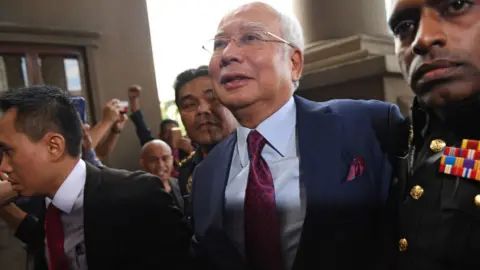 Getty Images
Getty ImagesThere is a new twist in the multi-billion-dollar financial scandal surrounding the Malaysian investment fund 1MDB - possible Chinese involvement.
Malaysia's new government - which took office only in May - has suspended three major construction projects with Chinese firms.
A senior ministry official told the BBC that it believes that two of the contracts, for pipelines, were used to launder money for Malaysia's previous administration, led by the former Prime Minister, Najib Razak.
These allegations open a new front in the inquiries into 1MDB, which is already being investigated in the US, Switzerland and Singapore.
The finance ministry's accusations also represent a sharp change in mood in Malaysia towards China since Mr Najib lost power.
The investigations into 1MDB are being led by Malaysia's finance ministry, housed in a vast curved building in Putrajaya, a purpose-built town to the south of Kuala Lumpur that has been the country's administrative capital for the past two decades.
Until the election in May, Tony Pua was an opposition MP who spent much of his time talking about 1MDB, which he calls "the great grandmother of all scandals".
He made a series of scurrilous videos about the fund and its alleged connection to Mr Najib.
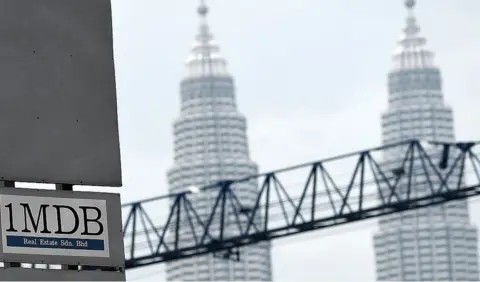 Getty Images
Getty ImagesBut now Mr Pua's party is in government and he has been employed as a special officer to the finance minister to look through the mountains of documentation related to 1MDB.
Before his current job, he said he worked with "dribs and drabs" of information about 1MDB - but not any more. "Now, anything you ask for, the tap opens like a beer barrel," he told the BBC in an interview at the ministry.
Mr Pua said the new administration had been astounded by what it had found, which has extended the scope of what was previously known about 1MDB, including links to Chinese firms.
Earlier this month (6 July), the ministry announced that it had suspended three big contracts with Chinese companies.
Two of those are pipeline schemes worth a combined total of $2.3bn (£1.7bn).
The ministry's new leaders were staggered to discover that 88% of the contract cost had been paid to the Chinese company in charge, China Petroleum Pipeline Bureau - but only 13% of the work had been completed.
Mr Pua said building work had not even started; only consultancy studies had so far been completed.
"The entire project smelt like a scam. [There were] clearly elements of money laundering taking place," he said.
"We were giving money out - to a Chinese company - and we suspect this money is being funnelled to parties related to the previous administration."
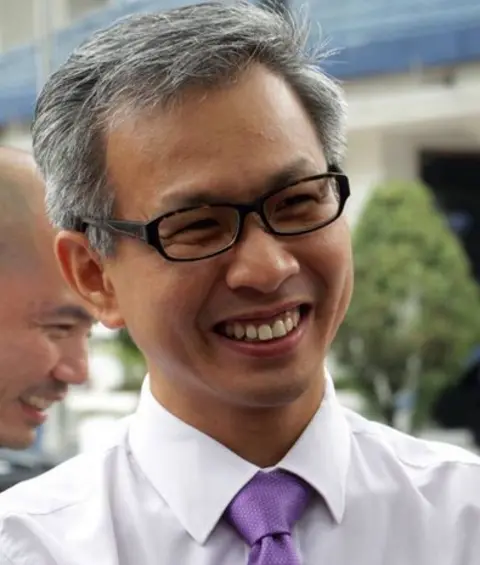 Tony Pua
Tony PuaHe said the ministry believes the money was being used to cover debts linked to 1MDB, which he said now stand at more than $12bn.
Emails to China Petroleum Pipeline Bureau about Mr Pua's allegations went unanswered, but the Chinese embassy in London gave its response.
"We have noted the relevant report. China has all along conducted economic, trade and investment cooperation with Malaysia, as well as other countries, with the principle of mutual benefit and win-win outcomes," said a spokesman.
Malaysia's finance ministry has also suspended the East Coast Rail Link, which is being built by the China Communications Construction Company.
It said the cost of the rail line, $20bn, "must be reduced significantly to make it viable financially".
The ministry said the suspension of both the pipelines and the rail link were not directed at "any particular country", but the new government in Malaysia has certainly brought about a change in attitude to links with China.
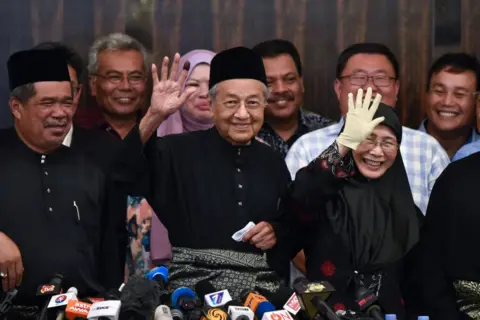 Getty Images
Getty ImagesThe new Prime Minister, Mahathir Mohamad, is expected to travel to China in August, when some of the suspended contracts could be renegotiated.
But China's nationalistic newspaper, the Global Times, warned Malaysia not to push China too hard.
"If [Mr] Mahathir wants to review big projects agreed to by his predecessor and damage the interests of Chinese companies, those companies have the right to claim compensation," it said in an editorial.
Professor Terence Gomez, of the University of Malaya, said the close relationship between China and Malaysia that existed until the election in May was convenient to both sides.
He said Mr Najib needed foreign investment and China under Xi Jinping was willing to provide it as part of its Belt and Road initiative, which aims to connect the country with the rest of Asia and beyond.
"Two state governments, both authoritarian regimes, both single dominant party states with powerful leaders, had an agenda," he said.
Professor Gomez said many of those investments were good for Malaysia, such as last year's deal by the Chinese car firm Geely to buy a stake in the ailing Malaysian automaker, Proton.
And he said there was still an appetite in the new government for Chinese money. He pointed out that one of the first businessmen to visit Mr Mahathir when he took office was the Chinese e-commerce billionaire, Jack Ma.
But some Chinese investments now appear to be tangled up with the investigations into 1MDB, which was set up by Najib Razak in 2009 to spur economic development in Malaysia.
So far, the only tangible product of 1MDB is a new business district being built in central Kuala Lumpur called Tun Razak Exchange, where workmen swelter in the heat to complete the project.
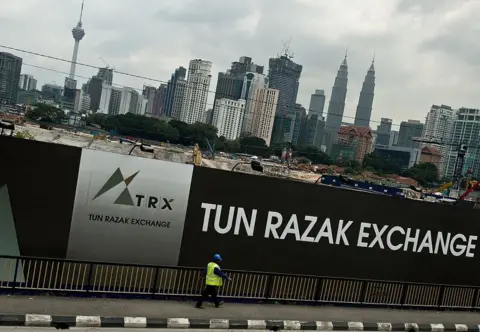 Getty Images
Getty ImagesAs for Mr Najib, earlier this month he appeared in Kuala Lumpur High Court charged with four counts of stealing a total of $10m from a subsidiary of 1MDB.
He denies the charges, and has always denied other wrongdoing related to the investment fund. Many of the hundreds of people who turned up for his first court appearance were supporters who believe in the former prime minister's innocence.
But the current government has already indicated that these are just the first of what could be many more charges brought against Mr Najib.
"We have to pace ourselves to make sure we do not miss anything," said Tony Pua, before heading back to his office to study more documents.
